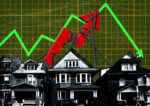Jason Merel of eXp Realty struggled to find listings for his buyers to tour on the North Shore this year, and he found data that backed up his anecdotal evidence of low inventory.
The number of active listings has decreased significantly in nine of the 12 towns that make up Chicago’s North Shore when compared to last year’s numbers, according to data available to agents through the local multiple listing service.
The median decrease in single-family homes listed across the affluent North Shore area compared to last year was about 20 percent, but the stats ranged from 9 percent to 38 percent depending on the suburb, according to Merel’s data.
This mirrors a broader trend of low inventory across much of Chicagoland, as average mortgage interest rates hover around 7 percent and dampen transaction volumes, according to Bankrate.
Chicago experienced a 20 percent drop in home sales from 2022 to 2023 amid high interest rates and low inventory.
On the North Shore, homes listed for under $1.5 million are the first to go, typically within a day or two.
“As something goes on the market, it’s gone,” said Andra O’Neill, an agent with @properties Christie’s International Real Estate. “You have to really be prepared as a buyer’s broker to move on it if it’s something good, because you’re not going to be alone in that.”
This is due, in part, to heightened mortgage rates, Merel and O’Neill said. Some homeowners are looking at double the rate of their current mortgage if they move, O’Neill said, which can be a pretty big incentive to sit tight.
Nationally, 82 percent of mortgaged homeowners have a rate of less than 5 percent — two percentage points lower than the current rate — and 40 percent of homeowners don’t have a mortgage at all, according to a 2023 Redfin study and Axios.
For those who don’t have a mortgage, the pull to stay put, given the current market, is even stronger, Merel said.
Another factor, particularly in the luxury market, is the lack of new construction of homes in Illinois in recent years. The state’s housing stock increased by just 0.2 percent from July 2021 to July 2022, the lowest new construction rate in the country alongside Rhode Island and New Jersey.
This contributed to a 15-year high in the Chicagoland area’s housing affordability crisis, real estate data firm Attom found.
In general, “people are, in fact, staying in their houses longer, and it’s adversely affecting the availability of properties in the market,” Merel said, based on his observations and recent research conducted by insurance company The Zebra.
Low inventory creates a “domino effect,” O’Neill said. Most people looking to sell will buy a new home before they list their own, she said, but if they can’t find a home to move into, they may choose not to list their home at all.
This is less of a concern for people moving to high-inventory places, like Texas, she said.
Less supply, of course, means higher demand and higher prices, making things even harder on would-be sellers who can’t find a place to move to, Merel said.
“Either they’re outbid in a multi-offer situation, or they’re sitting on the sidelines because they don’t want to get involved in a bidding war,” he said. “And because of that, their home is not on the market.”
This is particularly intimidating for first-time homebuyers who may be looking to move to the suburbs but, because of how hot the suburban market is, find themselves up against all-cash offers, Merel said.
Luxury sellers may be in a better position to wait longer for the right buyer to come along, or remove their listing altogether. Luxury buyers can also afford to be more discerning, and they’re willing to wait for the perfect home to come on the market, he said.
High-end luxury buyers are less likely to “settle,” and the cost of materials to rehab an “imperfect” home remain heightened — all of which leads to low sales and less inventory, Merel said.
None of this will change until interest rates come down far enough to sweeten the deal for potential sellers, at least below five percent but likely lower, Merel said.
“I’m doing cold calls daily, and just trying to find folks that maybe want to hit the market again,” he said. “It’s tougher, with less inventory.”
Read more


